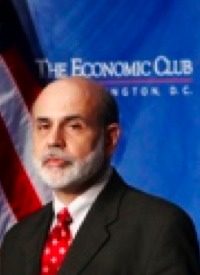
Federal Reserve Chairman Ben Bernanke told the Economic Club of Washington that the economy is recovering, even as it confronts “formidable headwinds.”
He also promoted the Federal Reserve, and the job he is doing as head of the Fed) in an op-ed piece he wrote recently in the Washington Post where he assured readers (and Congress) that “the Fed played a major part in arresting the [financial] crisis, and we should be seeking to preserve [the Fed’s] ability to foster financial stability and to promote economic recovery without inflation.”
He went on to say that the “government’s actions were … necessary to prevent a global economic catastrophe that could have rivaled the Great Depression.”
And then, in a self-deprecating comment, he assured readers that he knew “something about this, having spent my career prior to public service studying these issues”.
Bernanke finished his comments by reassuring his readers that “the ultimate goal of all our efforts is to restore and sustain economic prosperity [by depending] heavily on our credibility.”
Some sharply disagree with Bernanke’s assessment that the Fed knows what it is doing.
For instance, Nassim Nicholas Taleb, author of The Black Swan (and the subsequent popularization of the Black Swan Theory) said in the Huffington Post:
What I am seeing and hearing on the news – the reappointment of Bernanke – is too hard for me to bear. I am not blaming Bernanke [who] doesn’t even know he doesn’t understand how things work [in the real world]; it is the Senators appointing him who are totally irresponsible. [It’s as if] we promoted every doctor who committed malpractice. [Keynesian] economics make homeopath and alternative healers look empirical and scientific.”
Senator Bernie Sanders (Independent-Vt.) said: “The middle class is collapsing [and] Bernanke missed the boat on the most significant economic crisis since the Great Depression.”
Senator Jim Bunning (R-Ky.) was even more direct:
Four years ago when you came before the Senate for confirmation to be Chairman of the Federal Reserve, I was the only Senator to vote against you. In fact, I was the only Senator to even raise serious concerns about you. I opposed you because I knew you would continue the legacy of Alan Greenspan, and I was right. But I did not know how right I would be and could not begin to imagine how wrong you would be in the following four years….
You put the printing presses into overdrive to fund the government’s spending and hand out cheap money to your masters on Wall Street, which they use to rake in record profits while ordinary Americans and small businesses can’t even get loans for their everyday needs…. You have decided that just about every large bank, investment bank, insurance company, and even some industrial companies are too big to fail. Rather than making management, shareholders, and debt holders feel the consequences of their risk-taking, you bailed them out. In short, you are the definition of moral hazard.
Paul Farrell of www.MarketWatch.com confirmed Bunning’s conclusions:
In early 2008 before Obama’s nomination, I questioned Bernanke’s character. He often testified before Congress siding with Wall Street’s Trojan Horse, Henry Paulson, the ex-Goldman CEO running the Treasury. Both minimized credit, currency, derivatives and economic problems. Later we learned he was misleading us about how bad things were, how long he knew. My conclusion: Bernanke cannot be trusted, he’s either a compulsive liar, or like Greenspan, Bernanke’s driven more by blind ideology than facts, research and the public good.
Although Bernanke’s reappointment as head of the Fed (his term expires early next year) appears to be certain, a reasonable question must be raised: What would happen if Bernanke wasn’t reappointed? Or a larger question: What would happen if the Fed itself were abolished?
Republican Congressman Ron Paul (Texas), author of End the Fed, answered both questions in remarks he made to the House of Representatives:
Abolishing the Federal Reserve will allow Congress to reassert its constitutional authority over monetary policy. The United States Constitution grants to Congress the authority to coin money and regulate the value of the currency. The Constitution does not give Congress the authority to delegate control over monetary policy to a central bank. Furthermore, the Constitution certainly does not empower the federal government to erode the American standard of living via an inflationary monetary policy.
With a stable currency, American exporters will no longer be held hostage to an erratic monetary policy. Stabilizing the currency will also give Americans new incentives to save as they will no longer have to fear inflation eroding their savings.
In fact, Congress’ constitutional mandate regarding monetary policy should only permit currency backed by stable commodities such as silver and gold to be used as legal tender. Therefore, abolishing the Federal Reserve and returning to a constitutional system will enable America to return to the type of monetary system envisioned by our nation’s founders: one where the value of money is consistent because it is tied to a commodity such as gold. Such a monetary system is the basis of a true free-market economy.
In conclusion, Mr. Speaker, I urge my colleagues to stand up for working Americans by putting an end to the manipulation of the money supply which erodes Americans’ standard of living, enlarges big government, and enriches well-connected elites, by cosponsoring my legislation to abolish the Federal Reserve.
Photo of Ben Bernanke: AP Images



